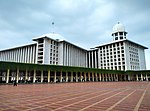
Tanjung Priok is a district in the administrative city of North Jakarta, Indonesia. It hosts the western part of the city's main harbor, the Port of Tanjung Priok. The district of Tanjung Priok is bounded by Laksamana Yos Sudarso Tollway and Sunter River canal to the east, by Kali Japat, Kali Ancol, and the former Kemayoran Airport to the southwest, by Sunter Jaya Road and Sunter Kemayoran Road to the south, and by Jakarta Bay to the north.

Suharto resigned as President of Indonesia on 21 May 1998 following the collapse of support for his 32-year long presidency. Vice President B. J. Habibie took over the presidency.
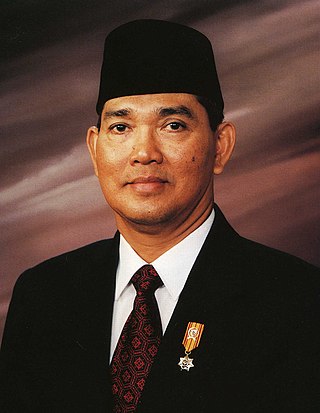
Try Sutrisno is an Indonesian retired army general who served as the sixth vice president of Indonesia from 1993 to 1998. Born in Surabaya, Dutch East Indies, Try graduated from the Army Technical Academy in 1959. During his career, Try held the positions of Chief of Staff of the Indonesian Army (1986–1988) and Commander of the Armed Forces of the Republic of Indonesia (1988–1993).

The Kopassus is an Indonesian Army (TNI-AD) special forces group that conducts special operations missions for the Indonesian government, such as direct action, unconventional warfare, sabotage, counter-insurgency, counter-terrorism, intelligence gathering and special reconnaissance (SR). Kopassus was founded by Alexander Evert Kawilarang and Mochammad Idjon Djanbi on 16 April 1952. It gained worldwide attention after several operations such as the Indonesian invasion of East Timor and the release of hostages from Garuda Indonesia Flight 206.
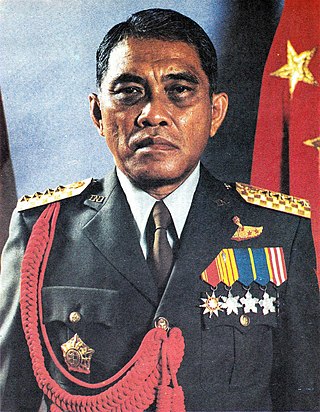
General (Ret.) Leonardus Benjamin Moerdani was the ABRI Commander from 1983 to 1988 and also served as Indonesia's Minister of Defense and Security. He is famous due to his strong stance in many decisive situations in Indonesian political and social life. He was also significant as a leader who was Catholic in a predominantly Muslim community.

Anton Medan, or Haji Muhammad Ramdhan Effendi, birth name Tan Hok Liang, born in Tebing Tinggi, was an Indonesian former robber and gambling tycoon who converted to Islam and became a preacher in 1992. He later established a mosque, Masjid Jami' Tan Hok Liang, in Pondok Rajeg, Cibinong, Bogor. Prior to his conversion to Islam, he grew up amid the dark politics of Indonesia. It was during Suharto's New Order rule when gangsters were used in politics, business and government agencies.
Human rights in Indonesia are defined by the 1945 Constitution and the laws under it; several rights are guaranteed especially as a result of the constitutional amendments following the Reform era. The Ministry of Law and Human Rights deals with human rights issues in the cabinet, and the National Commission on Human Rights, established in Suharto's New Order administration in 1993, is the country's national human rights institution.

Port of Tanjung Priok is the busiest and most advanced Indonesian seaport, handling more than 50% of Indonesia's trans-shipment cargo traffic. The port is located at Tanjung Priok, North Jakarta, which is operated by Indonesian state owned PT Pelindo. The port loaded and unloaded 6.2 million, 6.92 million, and 7.8 million TEUs of cargo during 2016, 2017 and 2018 respectively, out of a total capacity of about 8 million TEUs. The container port ranked as 22nd busiest in the world by Lloyd's One Hundred Ports 2019.
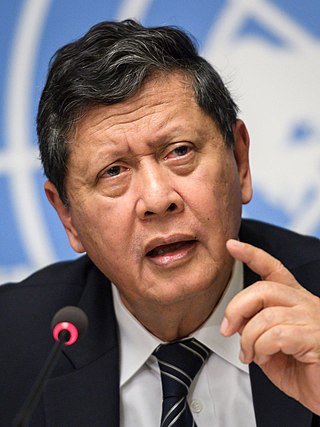
Marzuki Darusman is an Indonesian lawyer and human rights campaigner who served as the Attorney General of Indonesia from 1999 to 2001. He currently serves as the chairman of an UN Human Rights Council mission on Myanmar since July 2017. He is the Director-General of the Human Rights Resource Centre for ASEAN.
The following is a timeline of the history of the city of Jakarta, Indonesia.
The National Commission on Human Rights is the national human rights institution (NHRI) of Indonesia. As with other NHRIs, its principal functions are the protection and promotion of human rights.
The Cebongan Prison raid was an action undertaken by members of Indonesian Army special forces (Kopassus) when they attacked Cebongan Penitentiary Institution in Sleman Regency, Special Region of Yogyakarta, Indonesia, on 23 March 2013. Four detainees suspected of murdering a former Kopassus sergeant were killed in the attack. The National Commission on Human Rights investigated and concluded that the attack had been a human rights violation, though this was disputed by Defense Minister Purnomo Yusgiantoro.

The 1997/1998 activists kidnapping were abductions of pro-democracy activists which happened between the 1997 Indonesian Legislative Election and the fall of Suharto in 1998. The kidnappings took place in three different phases: before the May 1997 Indonesian legislative elections, two months before the People's Consultative Assembly (MPR) session in March 1998 and in the period just before Soeharto's 21 May resignation. None of those abducted during the first and third period have reappeared. Some of the activists who were abducted in the second period have openly spoken about their experiences.

The Islamic Defenders Front was an Indonesian hardline Islamist organization founded in 1998 by Muhammad Rizieq Shihab with backing from military and political figures. Since 2015, Ahmad Shabri Lubis has been the organization's leader, while Rizieq Shihab holds the title of Grand Imam of the FPI for life. The FPI originally positioned itself as an Islamic religious police, mostly by conducting illegal and unauthorized vigilante operations. It also acted as an Islamist pressure group with prominent social media activism and mass mobilizations against pro-government activists, ethnic Chinese, Christian minority, as well as liberal and reformist politicians.
The 2003 Wamena incident involved a sweeping operation and forced relocation of civilians around the town of Wamena by the Indonesian Army and the Indonesian National Police following a raid on an armory. The operations lasted for around two months following the raid, displacing thousands of civilians and resulting in the deaths of around fifty civilians from various causes.
The Semanggi shootings in Jakarta, Indonesia, were two incidents when state troops opened fire on unarmed civilians and protesters during special sessions of parliament. The first incident, known as Semanggi I, took place on 13 November 1998 and 17 people were killed. The second incident, Semanggi II, took place on 24 September 1999 and 12 people were killed and more than 200 wounded.
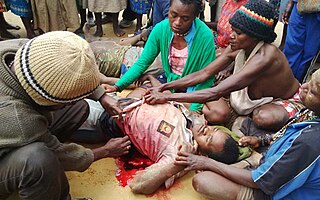
The Bloody Paniai case, or the Enarotali Massacre was a mass shooting by the Indonesian army from 753rd Special Raider Infantry Battalion of Korem 173/Praja Vira Braja of Kodam XVII/Cendrawasih which killed five teenagers and wounded of 17 others in Enarotali, Paniai Regency, Central Papua, Indonesia on 8 December 2014.

Feminism in Indonesia refers to the long history of discourse for gender equality to bring about positive social change in Indonesia. The issues women in Indonesia currently are facing include gender violence, underage marriages, and lack of representation in the political system. Feminism and the women's right movement began during colonial Indonesia under Dutch rule and were spearheaded by the national heroine Kartini, a Javanese noblewoman who advocated for the education of all women and girls regardless of social status. In the early 19th century, women's rights organizations and movements were allowed to developed under Budi Utomo, the first Indonesian Nationalist organization. Modern day Indonesian feminism include and are influenced by both fundamentalist and progressive Islamic women's organizations.
The Law on Sexual Violence Crimes is a law aimed to tackle sexual violence in Indonesia. The bill of the law was proposed on January 26, 2016. The law focuses on the prevention of sexual violence, more rights for victims and to acknowledge marital rape.

Taheri Noor was an Indonesian army general, politician, and physician. He served as a member of the People's Representative Council from 1990 until 1997 and in the National Commission on Human Rights from 2002 until 2007.












